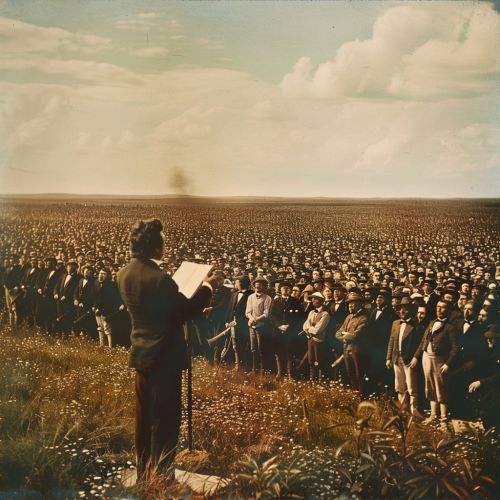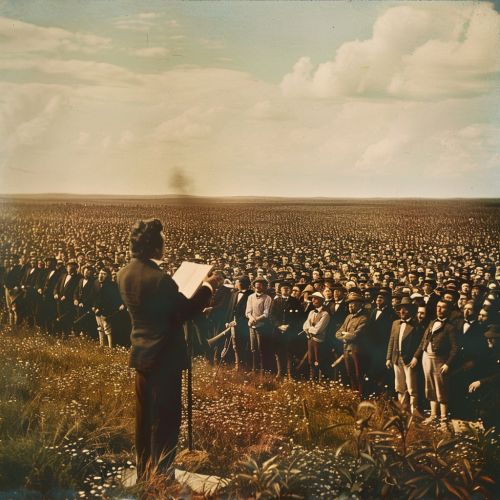George Whitefield
Early Life and Education
George Whitefield was born on December 16, 1714, in Gloucester, England. He was the youngest of seven children born to Thomas Whitefield and Elizabeth Edwards. His father was an innkeeper, and his early life was marked by the financial struggles of his family. Whitefield attended the Crypt School in Gloucester, where he showed an early interest in literature and performance, often participating in school plays.
In 1732, Whitefield entered Pembroke College, Oxford University, as a servitor, a position that required him to perform menial tasks for wealthier students in exchange for his education. It was at Oxford that Whitefield became involved with the "Holy Club," a group of students led by John and Charles Wesley, who were dedicated to rigorous religious practices. This group would later be known as the founders of Methodism.
Religious Conversion and Ordination
Whitefield experienced a profound religious conversion during his time at Oxford, which he described as a "new birth." This experience was pivotal in shaping his theological outlook and his future ministry. In 1736, he was ordained as a deacon in the Church of England, and he began preaching with a fervor that would become his hallmark.


Evangelical Ministry
Early Preaching
Whitefield's early preaching was characterized by its emotional intensity and dramatic delivery. He quickly gained a reputation as a powerful orator, capable of moving large crowds. His sermons often emphasized the need for personal conversion and the experience of the "new birth." Whitefield's style was influenced by his background in theater, and he used vivid imagery and expressive gestures to captivate his audience.
The Great Awakening
Whitefield played a crucial role in the Great Awakening, a series of religious revivals that swept through the American colonies in the 18th century. He made his first trip to America in 1738, where he preached in Georgia and other colonies. His dynamic preaching drew massive crowds, and he became one of the most well-known religious figures of his time.
Whitefield's itinerant ministry took him up and down the American colonies, from New England to Georgia. He preached in churches, open fields, and any venue that could accommodate the large crowds that came to hear him. His message of salvation through faith in Jesus Christ resonated with many, leading to widespread religious fervor and the establishment of numerous new congregations.
Theological Views
Whitefield was a staunch Calvinist, and his theology was heavily influenced by the works of John Calvin and Augustine. He believed in the doctrines of predestination and election, which held that God had chosen certain individuals for salvation before the foundation of the world. This belief sometimes put him at odds with other leaders of the Great Awakening, such as John Wesley, who held Arminian views that emphasized free will.
Despite these theological differences, Whitefield maintained a close relationship with the Wesleys and other revival leaders. He was known for his irenic spirit and his willingness to cooperate with those who held different theological views, as long as they shared a commitment to evangelical principles.
Impact and Legacy
Influence on American Christianity
Whitefield's impact on American Christianity was profound. His preaching helped to break down denominational barriers and foster a sense of unity among evangelical Christians. He was instrumental in the spread of Methodism and the establishment of numerous new churches and religious societies. His emphasis on personal conversion and the "new birth" became central themes in American evangelicalism.
Educational and Charitable Work
In addition to his preaching, Whitefield was involved in various educational and charitable endeavors. He founded the Bethesda Orphanage in Georgia, which aimed to provide education and care for orphaned children. The orphanage faced numerous challenges, including financial difficulties and opposition from local authorities, but it remained a significant part of Whitefield's ministry.
Literary Contributions
Whitefield was also a prolific writer. He published numerous sermons, journals, and letters, which were widely read and circulated. His writings provide valuable insights into his theological views and the religious climate of his time. They also serve as a testament to his enduring influence on the evangelical movement.
Controversies
Whitefield's ministry was not without controversy. His dramatic preaching style and emotional appeals were sometimes criticized by more traditional clergy. He was also involved in disputes over theological issues, particularly his Calvinist views on predestination. Additionally, Whitefield's support for the institution of slavery has been a subject of significant historical debate. While he advocated for the humane treatment of enslaved people and sought to evangelize them, he also owned slaves and defended the practice as compatible with Christian principles.
Death and Commemoration
George Whitefield died on September 30, 1770, in Newburyport, Massachusetts, during one of his preaching tours in America. He was buried in the crypt of the Old South Presbyterian Church in Newburyport, where his tomb remains a site of historical interest.
Whitefield's legacy continues to be felt in the evangelical movement. He is remembered as one of the most influential preachers of the 18th century and a key figure in the Great Awakening. His life and ministry have been the subject of numerous biographies and scholarly studies, which continue to explore his impact on religious history.
